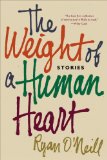Summary | Excerpt | Reviews | Beyond the Book | Readalikes | Genres & Themes | Author Bio

Stories
by Ryan O'Neill Excerpt
Weight of a Human Heart
COLLECTED STORIES
Twelve Stories (Bearsden Press, 1966)
My mother, Margaret Hately, was a short-story writer. In the few photographs I have of her she is carrying a book, holding it against her chest as if she were suckling it. There are no photographs of my father. My mother destroyed them when he left her, a month before I was born. I only know him from the parts of him she put in her stories – a limp, a way of reading the newspaper at arm's length. Whilst my mother wrote, my father was made of words.
When I was a child, I loved to watch my mother writing. She would sit at her scarred wooden desk under the stained-glass window in the hallway, the sunlight harlequinning the paper before her. Even now I see the top third of any page in a book as green, the middle blue, and the lower third as yellow. As she wrote, she would keep a cigarette burning in the ashtray at her elbow, occasionally blowing great smoky O's into the air. At these times I knew not to bother her. I liked to paint, and she never minded the mess as long as I was quiet. In my childish pictures my mother had eleven fingers, one of them being the pen she always held in her right hand. The morning was for writing and the afternoon for reading. She preferred dead authors to living ones; she wasn't as jealous of them. Still, she would weigh a book in the kitchen scales before reading it. 'Any book that weighs more than half a kilo isn't worth the trouble,' she said.
I learned very early that my name, Barbara, comes from the Greek word for foreigner. It's onomatopoeic, suggesting how the Greeks perceived the sound of other languages. Bar-bar-bar. My mother would often shake her head and say, 'Just because you're called Barbara doesn't mean you have to talk nonsense.' My father had chosen the name. Sometimes my mother would say to me, 'You look just like him,' but I never knew if this pleased her. I think she resented that my father had written half of me. He was killed in an industrial accident when I was six months old, and since he and my mother had never divorced, she received the compensation. With this money she was able to buy a five-acre block (her 'Writer's Block,' she called it) half an hour from Newcastle, and she built a house there, with lots of rooms and cupboards and hallways and bookshelves. There were so many places for hiding and eavesdropping, it might have been designed to stage Shakespeare's plays.
The Writer's Block was surrounded by a barbed-wire fence and had a large, untidy garden. Every day before dinner the two of us would do some weeding. I would happily pull up any green thing I saw, but my mother used some method I could never determine, taking a weed here, leaving one there. It was almost as if she were editing the garden. After dinner she would inspect my clothes to see if anything had been torn during the day, and I would stare at her eyes, which were a striking blue. The only make-up she wore was heavy black eyeliner. With her pencil, she would go over the
lines again and again. Since she refused to learn how to sew, and hated to shop, she would buy all our clothes through the post. If I needed shoes, she would make me stand on top of an old, opened novel, then draw around my feet, cut around the tracing and send the footprints off to a shop in Sydney. The new shoes would arrive a few days later.
At bedtime my mother would lie beside me, and instead of 'The Three Bears' or 'Rumpelstiltskin', she would read aloud the story she had been working on that day, making corrections as she went along. Drifting into sleep, I listened to the stories in her first collection many times. When she wasn't at her desk, she was always making notes. I heard from one aunt that my mother had been writing about childbirth even as my head was crowning. She wrote ideas on cigarette packets, newspapers, even in the fog on the window. She would often forget where she had written something and then we would both search the house for hours, examining every scrap of paper we could find.
Excerpted from The Weight of a Human Heart by Ryan O'Neill. Copyright © 2013 by Ryan O'Neill. Excerpted by permission of St. Martin's Press. All rights reserved. No part of this excerpt may be reproduced or reprinted without permission in writing from the publisher.




It was one of the worst speeches I ever heard ... when a simple apology was all that was required.
Click Here to find out who said this, as well as discovering other famous literary quotes!
Your guide toexceptional books
BookBrowse seeks out and recommends the best in contemporary fiction and nonfiction—books that not only engage and entertain but also deepen our understanding of ourselves and the world around us.